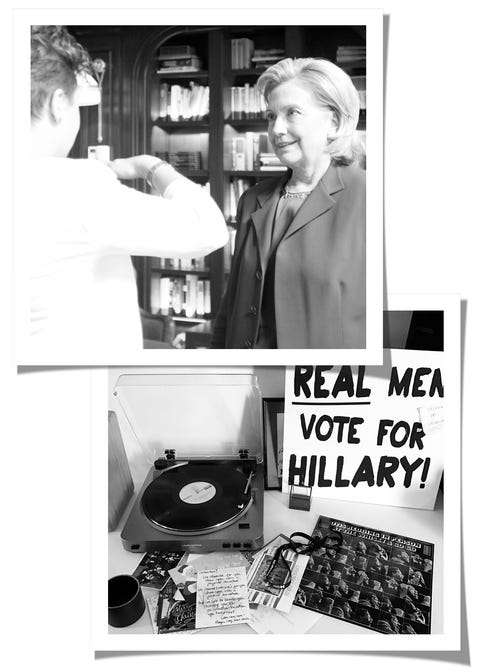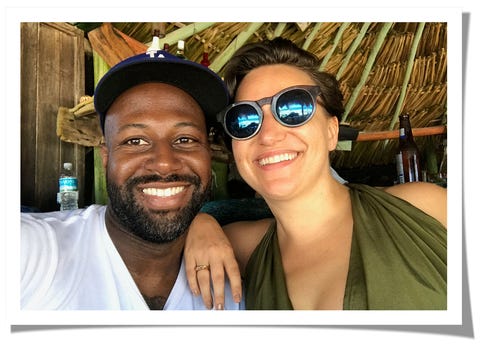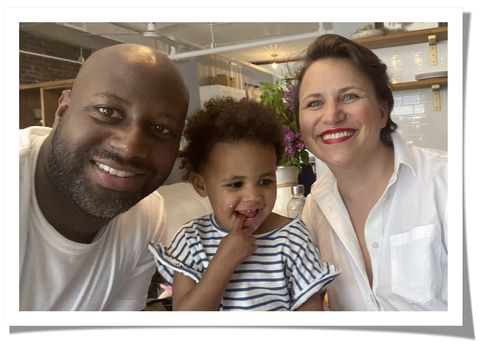The Black Man Had His Blues and the White Man Had His Schmaltz
For the first 37 years of my life, I considered myself largely exempt from the blind spots of white privilege. Intellectually, I knew the definition of the phrase: White privilege is the inherent advantages that come with being white. But I assumed I knew better than to let those advantages hinder my progressive way of life. I had worked in New York City media for years, leaving a big job in magazines to become director of creative engagement for Hillary Clinton's 2016 presidential campaign. I helped to organize the Women's March. I started my social impact agency Invisible Hand to assist companies like Instagram and organizations like Planned Parenthood as they put good work into the world. I was your favorite progressive's favorite progressive.
Then, I met Jordan. He was so handsome, I thought I might die. He was sharp and charismatic and when he smiled it looked like he was lit from within. I cringe to say that I loved him immediately, but here's the thing: I pretty much did. We did not take it slow. In fact, we shoehorned a decade's worth of life into our first 24 months together. We moved in together, started companies, got pregnant, miscarried, renovated an apartment and got pregnant again, only to spend the last trimester of the pregnancy living apart while I pursued a fellowship in a different city. In the beginning, when we fought — which we did, kind of a lot — I chalked it up to the stress of cramming all of that life into such a short span of time. But before long, I started to realize something bigger was at play: He is a Black man raised in the south. I am a white woman raised in Alaska. My whiteness, and my white privilege, really got in the way.
Of course I knew that Jordan and I would have cultural differences. On our first date, he asked me if he was the first Black man I'd dated (he was not), and told me that his relationships had spanned the map, too. We discussed how we thought our families would react, and the role our upbringings had played in our identities. I kind of thought we had it covered. We did not. Almost immediately, I began to understand my white privilege and unconscious bias in new, upsetting ways.
Just a few examples:
Last winter, Jordan and I were driving on a highway in New York headed upstate to look at real estate, when I casually mentioned that our license plates were about to expire. He got so angry with me that I worried he would crash the car.
"Do you realize that if a cop pulls us over for expired tags, I could be killed?" he said.
I had not realized.
Then, just this weekend, while driving the same stretch of highway, he mentioned that we were in the same borough where Eric Garner was murdered.
I mean, I really had not realized.
Then there was the time I pushed him to negotiate for a higher salary, thinking that the problem with his offer lay in his negotiating skills and not realizing that black men are serially underpaid, considerably more so than white women. And black women have it even worse.
I fought for pay equity my entire career. This, I had not realized.
Or the time we spent New Year's with friends, in Malibu, California, and I gave him a hard time for isolating himself in our room with his iPad instead of joining group activities. He finally said, "You don't get it. Y'all white people move through the world like the way it is for you is the way it is for everybody. I'm trying to tell you that it's not. People treat me differently here. They cross the street when they see me coming. Stop trying to get me to go on your hike."
I had not realized.
Or every single time we fight and I say, "When you start yelling, I stop listening," without realizing that what I hear as a yell is just how they talk in his family, and that half the time I think I'm fighting with Jordan he isn't even mad. I'm not used to that tone because I never had to yell in order to be heard: The world was always listening. But instead of moderating my reaction, my impulse is to ask him to speak differently—hey, husband, change your tone to make me feel more comfortable. Make yourself familiar to me, please. Come over to my side of the road.
I have too many stories like this, and the moral of them is always the same: It does not matter how many marches I have planned or how many progressive candidates I have campaigned for or how many times I have chanted Black Lives Matter in the streets: I am rife with internalized racism and unconscious bias. And to all of the non-Black folks reading this, we need to get clear on something: So are you.
To be raised white in America is to be told in countless small ways that how you live is correct. It means having your image and your values reflected back at you — in the education you received, the toys you were sold, the ideals of beauty you were given. Over time, this message imbeds itself so deeply in us that we can no longer recognize it as the false narrative that it is. We lose our sense of culpability, misunderstanding racial inequality as something to empathize with instead of something that we created and are uniquely required to solve.
This spring, when Dominique "Rem'mie" Fells, Breonna Taylor and George Floyd were murdered, a fog rose up in our house. As protests raged across the country, I wondered what we would tell our daughter, now two years old, about the people marching down our street. Just weeks before, we were teaching her to wear a mask when leaving the house. Now, we were adjusting our rituals, adding, "Goodnight Protestors! We love you!" to the rounds of blessings we wished upon the city each night at bedtime. During the days, I did what I normally do when our country takes a hit: I got down to business, working with fellow activists to fight for policy change and advising companies and friends about how to get involved in the hard work of making systematic change. It wasn't feeling like enough.
Systematic change is critical. Better schools. A functioning justice system and an end to police brutality. Reparations. But until white women like myself do the work to examine our role in this racist system, and to repair the collateral damage we have caused, Black people in this country will never truly be liberated. Systems, hearts and minds — that's the combo.
Recently, with my husband's blessing, I took to Instagram, outlining ways in which my own bias and internalized racism had hurt our partnership. I hoped that by spelling it out, it would help my family and friends start the work of examining their own culpability.
It is hard work. It is embarrassing and shameful, and every time I post, I fear that this latest confession could be the one that will expose me as irredeemable — too privileged to be deserving of the man I love, too far gone to be a suitable mother to my black daughter.
This content is imported from Instagram. You may be able to find the same content in another format, or you may be able to find more information, at their web site.
But every time I do, I get a message from a white friend saying something like, "I drove with expired tags just yesterday," or, "I had no idea about the pay gap." I've worried about centering myself in these stories (something white women are awfully prone to do), but my Black friends and family have been broadly generous, saying they are grateful not to have to do the work to break down clearly the things they live with every day (even though, as one said, "It's like racism 101 up in your feed, but if this is what the people need, please dear god, give it to them."). If I can redirect some of the labor — or even the trolls — that too often gets sent in their direction, well, that's a good day's work for me.
I am the mother of a black daughter.
I am the wife of a black man.
If I want to be worthy of them — and I do — I have to at least start here.
Will you join me?
Genevieve Roth is the founder of Invisible Hand, a social impact and culture change agency based in New York. Previously, she was a Shorenstein Fellow at the Harvard Kennedy School, served as the creative engagement director for the 2016 Hillary Clinton presidential campaign and as an executive director of special projects at Glamour Magazine. She is a born and raised Alaskan, which she feels is important for you to know. You can connect with her on Instagram. Genevieve donated the fee for this essay to Black Lives Matter.
This content is created and maintained by a third party, and imported onto this page to help users provide their email addresses. You may be able to find more information about this and similar content at piano.io
Source: https://www.goodhousekeeping.com/life/relationships/a32909116/white-privilege-marriage-essay/



0 Response to "The Black Man Had His Blues and the White Man Had His Schmaltz"
Post a Comment